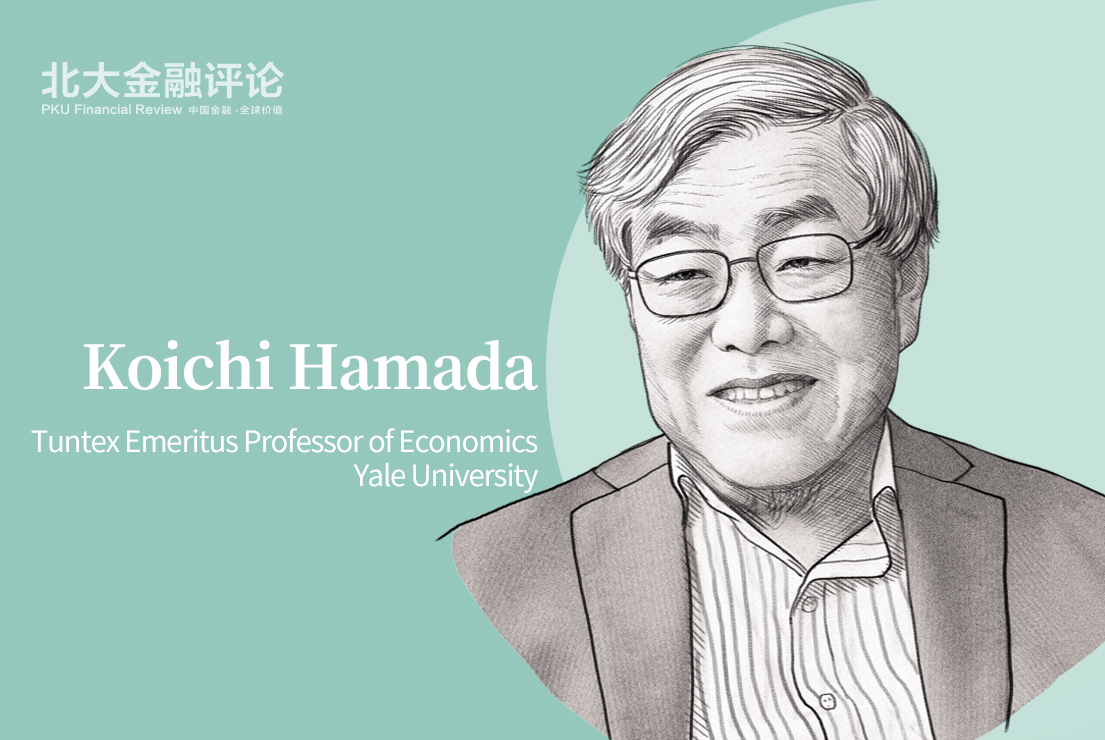Koichi Hamada is the Tuntex Emeritus Professor of Economics at Yale University, and one of the most famous Japanese economists. As the economic adviser to Japan's Prime Minister Shinzo Abe, he designs and promotes "Abenomics". In the interview with PKU Financial Review, Koichi Hamada states that, the grades of the achievements of "three arrows" were consecutively A-B-E.
PKU Financial Review: Positioning: Professor Koichi Hamada, we have great admiration for you as one of the greatest economists in the world, it’s our great honor to seek your advice on questions related to global economic status.
Koichi Hamada: Reflecting on the tightening diplomatic tension between China and Japan, some friends of mine discouraged my communication with you. Yoichi Funabashi, formerly of the Asahi News and President of the Asia Pacific Initiative, however, strongly recommended talking to you. He told me that academic exchanges between scholars would help in the long run, and also that was what Shinzo Abe aimed at the same time while he built up Japan's defense power.
Now, even Japanese presses occasionally misquote my opinions on economic policies. Under these circumstances, I hope that I could quote check your publication of my answers precisely.
PKU Financial Review: Many people believe that the new governor of the Bank of Japan, Kazuo Ueda, will definitely change the Bank of Japan’s quantitative easing policy and increase Japan’s real interest rate. This is a trend that no one can resist. Do you think this will be the case? Are you willing to bet that the yen will appreciate in the long run?
Koichi Hamada: This is a crucial question everybody wants to know but nobody can tell for sure. The BOJ had to rely on the YCC under continuous deflationary expectations in spite of quantitative ease. On the other hand, higher interest rates abroad may require higher short-term interest rates in Japan at some moments to prevent extreme depreciation of the yen. Kazuo Ueda is expected to reconcile both needs without causing banking crises that occurred in the US or in Europe.
PKU Financial Review: We all appreciate the reform courage of former Japanese Prime Minister Shinzo Abe and mourn his unfortunate passing away. You are the main designer of Abenomics. Abenomics is based upon "three arrows:" monetary easing from the Bank of Japan, fiscal stimulus through government spending, and structural reforms. Do you think Abenomics has achieved its policy goals? Has Japan completed its structural reforms?
Koichi Hamada: I joked the grades of the achievements of three arrows were consecutively A-B-E. E signifies "Efforts only without substantial results".
PKU Financial Review: We read your papers in the 1990s and found that you studied Asian regional economic integration very early. In recent years, due to the competition between China and the United States, the paradox is that Asia seems to have become not only divided but also continuously integrated. Most Asian countries hope to join the camp of regional economic integration initiated by China and the United States. They do not want to offend either party. What do you think of this trend?
Koichi Hamada: I was under a light clinical depression during the 1990s and do not remember what I wrote. Now I am interested in how the management of a high-pressure economy through lower exchange rates than competitive level might have achieved good performance in South-East Asian countries.
PKU Financial Review: We learned some of your views on the aging society from Youtube, but unfortunately, we do not fully understand. For example, Japan is a result of an aging society, and both productivity and demand continue to shrink. However, Germany is a different story, with both productivity and demand continuing to rise. Therefore, some people argue that with the development of artificial intelligence and the advent of Industry 4.0 in the future, the decline in labor capacity brought about by aging will be compensated by artificial intelligence, and the work experience brought by aging is a newer human capital. This new type of older people will create greater productivity and greater demand. What’s your opinion about this?
Koichi Hamada: This question is based on your wrong information. In none of my (at least in the single-authored) writing, I have said that low birth rates are more important than monetary policy management. But your comments on Germany are useful to consider the above issue considering your third question.
* This article was initially published in PKU Financial Review.


